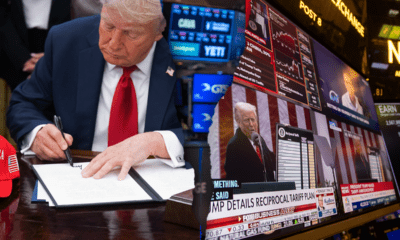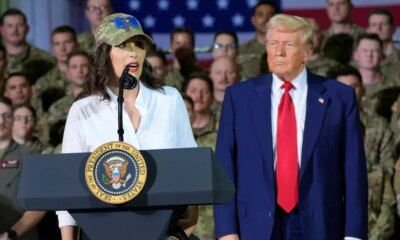INTERNACIONAL
Trump repeatedly walked back tariffs in first 100 days as White House announces latest duty tax relief

President Donald Trump has championed tariffs as the economic tool that will bring parity to the nation’s chronic trade deficit with foreign countries while boosting U.S. jobs and the economy. But many of Trump’s tariff polices have been walked back or paused after going into effect.
«I will immediately begin the overhaul of our trade system to protect American workers and families. Instead of taxing our citizens to enrich other countries, we will tariff and tax foreign countries to enrich our citizens,» Trump declared in his inaugural address Jan. 20, teeing up an onslaught of tariff policies that will take effect in the coming weeks and months.
Tariffs are taxes levied on imported goods and services that historically have contributed to a nation’s federal tax revenue. Developed countries, however, have since moved away from relying on tariffs as a main source of federal funding and have shifted to other forms of taxes — such as income, payroll or sales taxes.
On Tuesday, which marked Trump’s 100th day back in the Oval Office, Trump signed an executive action easing tariffs targeting car manufacturers as he headed to Michigan, historically the heart of the American auto industry, for a rally celebrating his return to the White House.
PRESIDENT DONALD TRUMP’S FIRST 100 DAYS: COMPANIES THAT WILL INVEST $1B OR MORE IN THE US
President Donald Trump has championed tariffs as the economic tool that will bring parity to the nation’s chronic trade deficit with foreign countries while boosting U.S. jobs and the economy. (Brendan Smialowski/AFP via Getty Images)
The upcoming auto plan will keep a 25% tariff on imported cars and a 25% tariff on imported auto parts but will offer offset credits to U.S. manufacturers for a two-year period in an effort to bolster the U.S. supply chain of car parts and encourage manufacturing in the U.S., according to the administration.
The plan will also not stack both auto and steel and aluminum tariffs on the auto industry. Only the higher tariff will be applied to car manufacturers, not a combined tariff.
The announcement is the latest of Trump walking back, pausing or easing tariffs as he looks to even the trade playing field for the U.S., while encouraging U.S. manufacturing and job creation. Industries that manufacture products on U.S. soil do not face any tariffs.
A White House official who spoke to Fox News Digital explained that while the past few months of tariff changes might seem chaotic in their entirety, each change was born out of a need to be flexible and an effort to bring manufacturing and jobs into the U.S. while ending the nation’s chronic trade deficit. The official noted that, as tariffs took effect, many nations and industry leaders have made good-faith efforts to negotiate terms favorable to the U.S., adding to the tariff changes.
AMAZON DENIES TARIFF PRICING PLAN THAT WHITE HOUSE CALLED ‘HOSTILE AND POLITICAL’
Trump’s tariff policies overwhelmingly focused on China, Mexico and Canada at the start of his second administration, as he looked to crack down on illegal immigration. It also was an attempt to stem the flow of the deadly synthetic opioid fentanyl, which overwhelmingly originates in China, from coming across the northern and southern borders.
Citing the threat of illegal aliens in the U.S. and the flow of fentanyl, Trump declared a national emergency in February under the International Emergency Economic Powers Act and imposed a 25% tariff on imports from Canada and Mexico and a 10% additional tariff on imports from China.
The tariffs sparked swift outrage from the three nations, and Trump paused the tariffs on Canada and Mexico for 30 days after the nations agreed to concessions, such as sending additional security personnel to their respective borders with the U.S.

Migrants walk along a road in a caravan in an attempt to reach the U.S. border, in Tapachula, Mexico, in November 2023. (Jose Torres/Reuters)
China, on the other hand, imposed tariffs on some U.S. imports in response to Trump’s tariffs. China’s Finance Ministry said Feb. 4, shortly after the tariffs started, that it would impose a tariff of 15% for coal and liquefied natural gas and 10% for crude oil, agricultural equipment and large-engine cars imported from the U.S.
GROCERY GIANT WARNS ITS SUPPLIERS THAT SUPERMARKET WON’T BE ACCEPTING TARIFF-RELATED PRICE HIKES
The administration official who spoke to Fox Digital pointed to the tariff changes for Mexico and Canada as part of negotiations to secure the border after Trump declared a national emergency under the International Emergency Economic Powers Act.
The tariffs on Mexico and Canada went into effect March 4 after the pause, while the tariffs on China were increased to 20%. A day later, after speaking with auto industry officials from Ford, General Motors and Stellantis, Trump walked back the tariffs if they affected the auto industry, granting a one-month exemption to tariffs «on any autos» from the two countries that abide by the 2020 U.S.-Mexico-Canada Agreement’s rules of origin.
Those rules were established under the first Trump administration, White House press secretary Karoline Leavitt said at a news conference at the time.
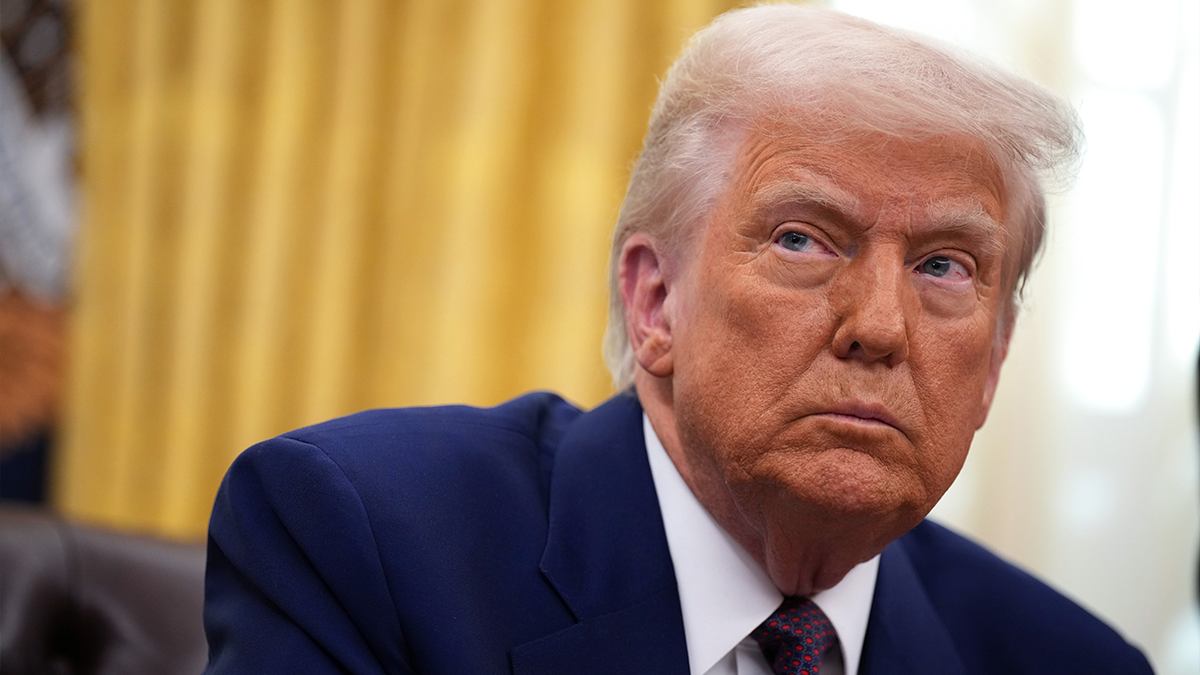
President Donald Trump (Andrew Harnik/Getty Images)
On March 6, Trump again walked back the 25% tariffs on many imports from Canada and Mexico while praising Mexican President Claudia Sheinbaum for helping secure the U.S.-Mexico border. He postponed the tariffs for 30 days and touted that his highly anticipated reciprocal tariff plan would take effect in the coming weeks.
DONALD TRUMP SHOULD BE PRAISED FOR SIGNALS HE MIGHT COOL TARIFF FIGHT, WASHINGTON POST EDITORIAL PRAISES
«I did this as an accommodation, and out of respect for, President Sheinbaum,» Trump said on Truth Social of the March 6 tariff pause. «Our relationship has been a very good one, and we are working hard, together, on the Border.»
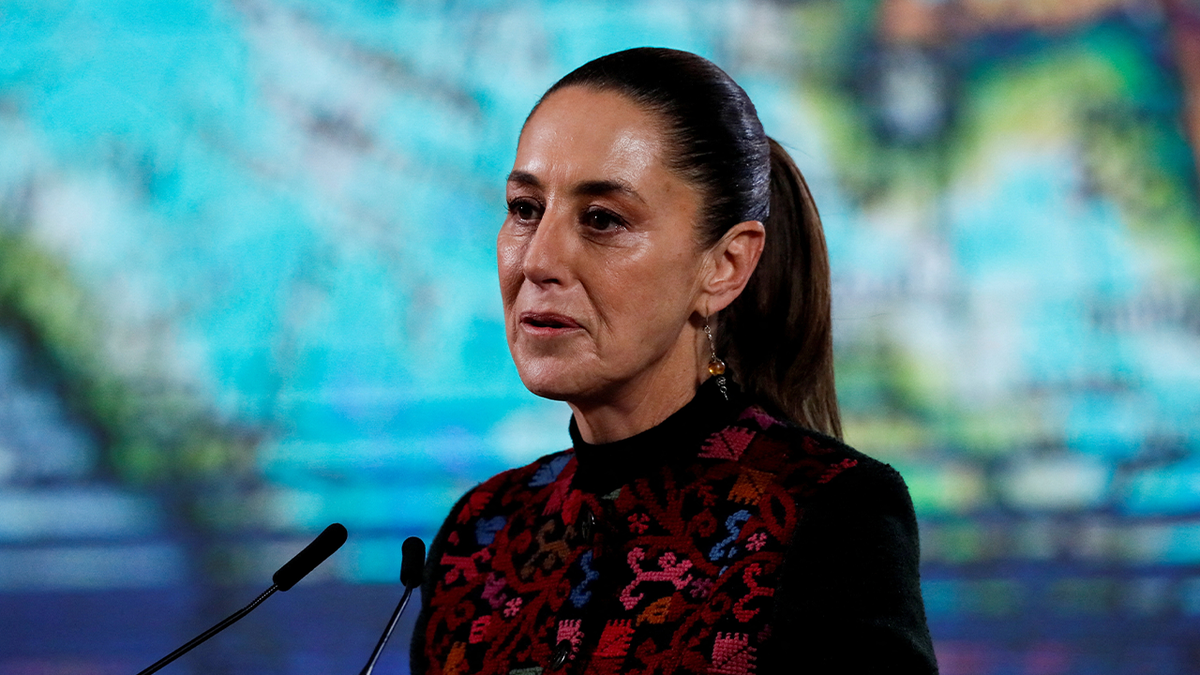
Mexican President Claudia Sheinbaum speaks during a press conference at the National Palace in Mexico City, Mexico, Jan. 8, 2025. (Henry Romero/Reuters)
While announcing and imposing tariffs on nations such as Mexico and Canada, Trump previewed a reciprocal tariff plan that would take effect April 2.
«On trade I have decided for purposes of fairness, that I will charge a reciprocal tariff — meaning whatever countries charge the United States of America, we will charge them no more, no less,» Trump said at the White House in February. «In other words, they charge us a tax or tariff, and we charge them the exact same tax or tariff. Very simple.»
Trump announced his highly anticipated reciprocal tariff plan as part of his «Liberation Day» announcement April 2. Trump announced customized tariffs on dozens of nations to help bring parity to what he said were decades of foreign nations installing trade barriers on U.S. goods, while also imposing a 10% baseline tariff on all countries.
«For nations that treat us badly, we will calculate the combined rate of all their tariffs, nonmonetary barriers and other forms of cheating,» he said. «And because we are being very kind, we will charge them approximately half of what they are and have been charging us. So, the tariffs will be not a full reciprocal. I could have done that. Yes. But it would have been tough for a lot of countries.»
TRUMP SAYS INCOME TAX CUTS, AND PERHAPS ELIMINATION, COMING DUE TO TARIFFS
The EU for example, was hit with a 20% tariff in the reciprocal tariff plan, compared to its 39% tariffs on the U.S., while Japan saw 24% tariffs compared to the 46% the country charges the U.S. China was hit with an additional 34% tariff, compared to the 67% it charges the U.S.
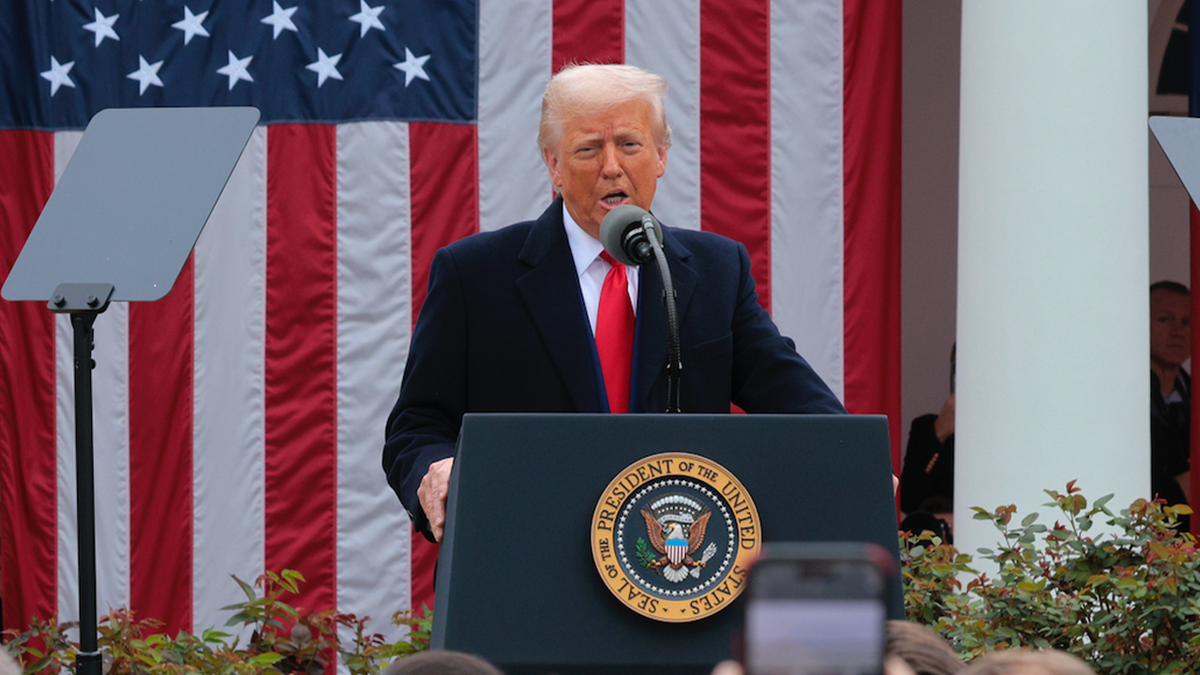
President Donald Trump speaks during a «Make America Wealthy Again» trade announcement event in the Rose Garden at the White House April 2, 2025, in Washington, D.C. (Andrew Harnik/Getty Images)
The same day the reciprocal tariffs were about to take effect April 9, Trump announced a 90-day pause on the customized duty taxes he had imposed on dozens of nations, which was an abrupt change of course from his previous comments that there would be no pause to those tariffs, only negotiations. The pause did not include the 10% baseline tariff on all nations.
«You have to have flexibility,» Trump told the media when asked about his credibility after pausing the tariffs. «I could say there’s a wall. … Sometimes, you have to go around or under the wall. Financial markets change. Look how much they changed. I think the word would be ‘flexible.’ You have to be flexible.»
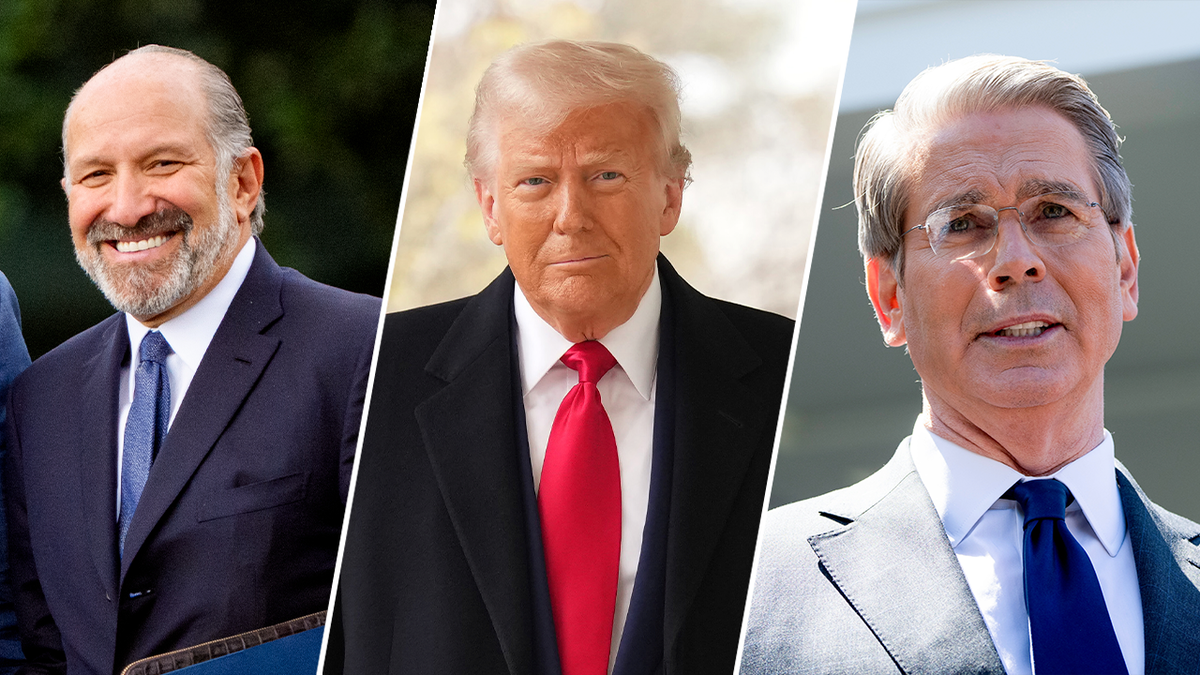
Commerce Secretary Howard Lutnick, President Donald Trump and Secretary of the Treasury Scott Bessent (Getty Images)
White House officials told Fox News Digital at the time that dozens of countries had reached out to the White House looking to make good-faith deals, and that the administration was zeroing in on renegotiating more favorable deals for the U.S.
Treasury Secretary Scott Bessent indicated in recent days that trade negotiations with at least South Korea and India are entering the final stages.
Other tariffs, such as a 25% tax on all steel and aluminum imports or the 10% baseline tariff on foreign nations, have remained in effect without change.
Trump has touted that with increased revenue from tariffs, U.S. citizens could see lower taxes and the possible elimination of the income tax.
CLICK HERE TO GET THE FOX NEWS APP
«When Tariffs cut in, many people’s Income Taxes will be substantially reduced, maybe even completely eliminated. Focus will be on people making less than $200,000 a year,» Trump wrote in a post on Truth Social April 13.
«Also, massive numbers of jobs are already being created, with new plants and factories currently being built or planned. It will be a BONANZA FOR AMERICA!!! THE EXTERNAL REVENUE SERVICE IS HAPPENING!!!»
Fox News Digital’s Eric Revell contributed to this report.
Donald Trump,Trump’s First 100 Days,Trade,Economy,White House,China,Canada
INTERNACIONAL
Suecia: al menos tres muertos en un tiroteo en una ciudad cercana a Estocolmo

Al menos tres personas han muerto en un tiroteo en el centro de la ciudad sueca de Uppsala, 70 kilómetros al norte de Estocolmo, según anunció un portavoz de la Policía en declaraciones a la agencia sueca
Poco después de las 17 (12 de la Argentina) hubo «llamadas de personas que escucharon fuertes detonaciones que parecían disparos en el centro de Uppsala«, indicó la policía en su web, y agregó que hay varias personas «con heridas que pueden haber sido causadas por disparos».
La policía sueca ha acordonado la plaza de Vaksala Torg de Uppsala tras registrarse un tiroteo que ha dejado al menos tres muertos, confirmados por la Policía, y un número indeterminado de heridos de bala. Las identidades de los fallecidos no han sido confirmadas puesto que aún no se han comunicado a sus familiares, añade el comunicado policial.
Por el momento se desconocen las causas del suceso. Se está buscando a uno o más sospechosos, ha asegurado el portavoz de la policía Magnus Jansson a medios locales. Según medios locales, uno de los sopechosos habría huído del lugar en scooter. Un helicóptero polcial sobrevuela la zona.
Se da la circunstancia de que este hecho a ocurrido en vísperas de Walpurgis, una de las principales fiestas en Suecia, que se celebra con hogueras en la calle.
Según medios suecos, testigos presenciales escucharon entre siete y nueve disparos y el tiroteo se produjo junto a una peluquería.
Las autoridades no han informado de ningún detenido, aunque de acuerdo con el tabloide Aftonbladet se busca a un hombre que huyó del lugar en una patineta eléctrico.
La policía ha puesto en marcha un amplio operativo policial que incluye helicópteros.
El tráfico ferroviario estuvo interrumpido durante cerca de una hora, informó el diario local UNT.
Suecia ha sufrido en los últimos años un aumento de tiroteos mortales debido a los conflictos entre bandas criminales, que han afectado también a las vecinas Noruega y Dinamarca.
Flera personer har skadats i en misstänkt skottlossning i centrala Uppsala, uppger polisen. En större polisinsats pågår vid Vaksala torg.
”Ett flertal personer anträffas med skador som tyder på skottlossning”, skriver polisen på sin hemsida.
Upsala Nya… https://t.co/jxVECL3Eq6— DagensNyheterNyheter (@DagensNyheter2) April 29, 2025
Los autores son cada vez más jóvenes, en muchos casos contratados como sicarios porque tienen menos de 15 años, la edad de responsabilidad penal en Suecia.
En enero la policía indicó que el número de tiroteos había disminuido en 2024 por segundo año consecutivo, con 296, un 20% menos que el año anterior.
Suecia ha experimentado tiroteos significativos, muchos de ellos relacionados con el crimen organizado y actos de violencia aislada, en los últimos años, a los que se suma el ocurrido este martes en la ciudad de Uppsala, en el que han muerto tres personas y varias más resultaron heridas.
A continuación se detallan algunos de los incidentes más relevantes:
– 19 de marzo de 2015: Miembros de bandas rivales abrieron fuego en un pub en Gotemburgo matando a dos personas e hiriendo a al menos ocho más. El ataque fue atribuido a una disputa entre bandas.
– 26 septiembre de 2016: Un fallecido y tres heridos fue el balance de un tiroteo en Malmoe (sur de Suecia). Los cuatro eran jóvenes de unos 20 años residentes en Malmoe y varios de ellos eran conocidos con anterioridad por la policía.
– 19 de junio 2018: Tres jóvenes murieron y varios más resultaron heridos tras el tiroteo ocurrido en el centro de Malmoe (sur de Suecia) relacionado con un conflicto entre bandas criminales locales.
– 21 de octubre de 2021: El rapero sueco Einar es asesinado en Estocolmo a consecuencia de los disparos de varios individuos. Al parecer, el joven cantante, de 19 años, debía testificar en un caso contra una pandilla.
– 19 junio 2022: Un tiroteo en un centro comercial en Malmoe dejó heridas a dos personas en lo que la policía consideró una vez más una disputa entre bandas criminales.
– 10 de junio 2023: Dos muertos y otros dos heridos fue el resultado de un tiroteo en un centro comercial de Estocolmo.
– 27 de septiembre 2023: Dos personas fallecieron en un tiroteo del crimen organizado en Estocolmo. Además, esa jornada una mujer murió en la explosión de un artefacto en su casa.
– 4 de febrero de 2025: Tiene lugar una de las peores tragedia en el país por violencia. Al menos 11 personas fallecieron en un tiroteo, incluido el presunto autor, en un centro educativo para adultos en Örebro, a unos 200 kilómetros al oeste de Estocolmo.
Suecia
INTERNACIONAL
Trump wagers US economy in high-stakes tariff gamble at 100-day mark
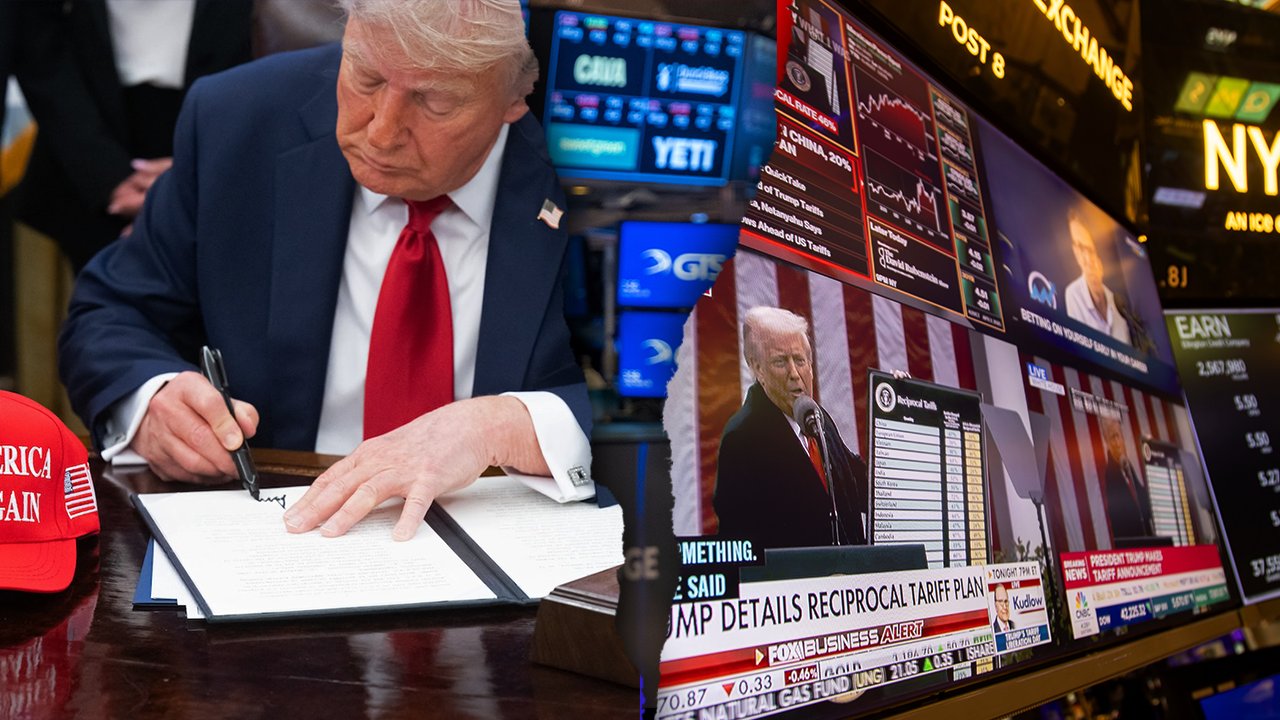
President Donald Trump campaigned for a second term on pledges to lower prices, create jobs and impose tough tariffs on imports, especially from China.
Dubbing himself the «Tariff Man» last fall, he told an audience at the Economic Club of Chicago, «To me, the most beautiful word in the dictionary is tariff.» However, in his first months in office, it is unclear whether Trump can, or should, implement the harsh reciprocal tariffs he announced in April against dozens of countries.
Now, 100 days into his second term, economists told Fox News Digital they see these proposed reciprocal tariffs as politically motivated, unnecessary and failing to secure the benefits from U.S. trading partners that Trump had been hoping for.
CHINA IS ‘CAVING’ TO TRUMP’S TRADE WAR STRATEGY, EXPERT SIGNALS
President Donald Trump holds a «Foreign Trade Barriers» document as he delivers remarks on tariffs in the Rose Garden at the White House in Washington, D.C., on April 2, 2025. (REUTERS/Carlos Barria/File Photo)
Instead, they warned, Trump’s tariffs could grind billions of dollars in trade to a halt between the world’s two largest economies, disrupt global supply chains and risk torpedoing the U.S. economy into a major slump or recession.
When Trump took office, chances of recession «were probably about 10%,» Justin Wolfers, an economist at the University of Michigan, told Fox News Digital in an interview. «Now, they’re up to around 55%.»
It is unclear whether Trump will continue to push through with these unpopular tariffs, which are slated to take force in early July. In the near-term, uncertainty and volatility remain.
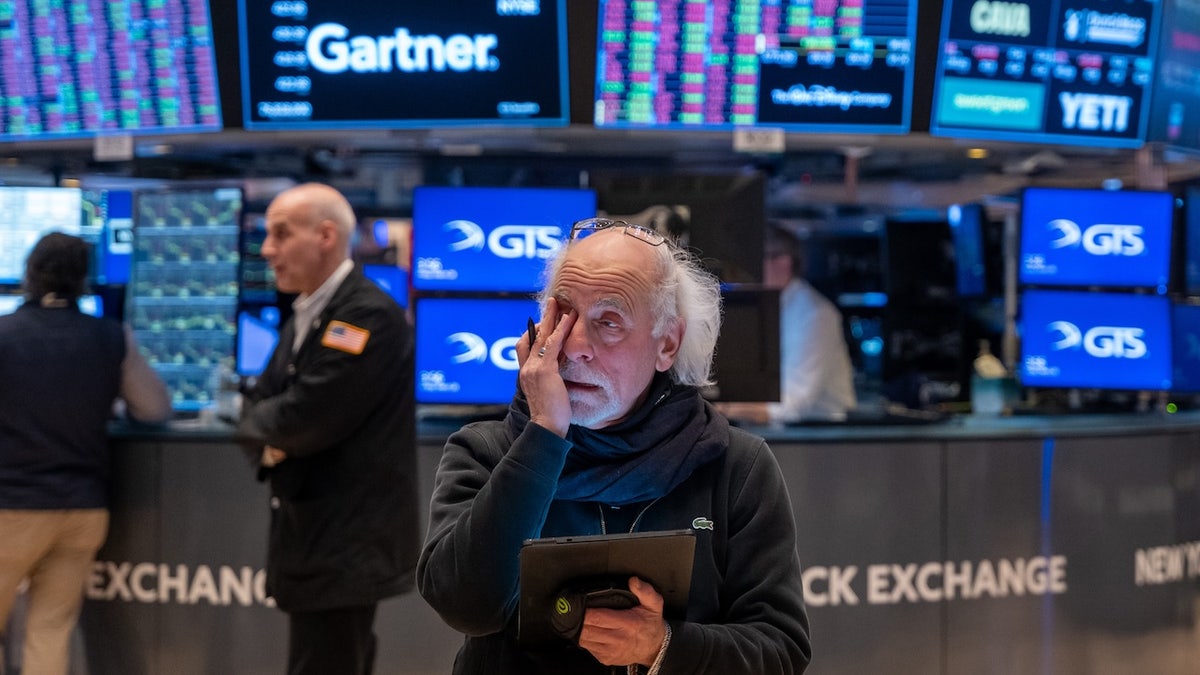
Traders work on the floor of the New York Stock Exchange in New York City on March 28, 2025 amid President Donald Trump’s escalating trade war. (Spencer Platt/Getty Images)
Short-term tariff impact
Trump announced tariffs on April 2, dubbed «Liberation Day.» The announcement included both a 10% universal baseline tariff and plans to enact larger tariffs on dozens of other countries, including China.
These new import taxes immediately sent stock markets into free-fall, triggering one of the largest single-day S&P 500 losses since World War II, and prompting deep and unyielding uncertainty over possible next moves.
«The only thing that’s happened that has pushed the odds of a recession up so high, so fast, is chaos coming from out of the White House,» Wolfers said.
Trump subsequently paused the reciprocal tariffs for 90 days to encourage the administration to make «deals» with countries on trade and encourage more investment in U.S. manufacturing. Even so, some prices have already risen in anticipation of higher costs under the new tariff regime.
Uncertainty has also played a role. Trump’s tariff announcement in April prompted a number of large container ships to abruptly halt their shipments to the U.S. earlier this month and turn back to their original ports. This means that more consumers will see a price hike for everyday products, likely at certain big-box retailer stores like Walmart or Target, as early as next month.
These price hikes are «not showing up tomorrow, but will show up over the next few months, as scarcities develop and American retailers have to find other sources – that might take a while,» David H. Feldman, an economist and professor at William & Mary College, said in an interview.
TRUMP’S ULTIMATUM TO FEDERAL WORKERS: RETURN TO OFFICE ‘OR BE TERMINATED’
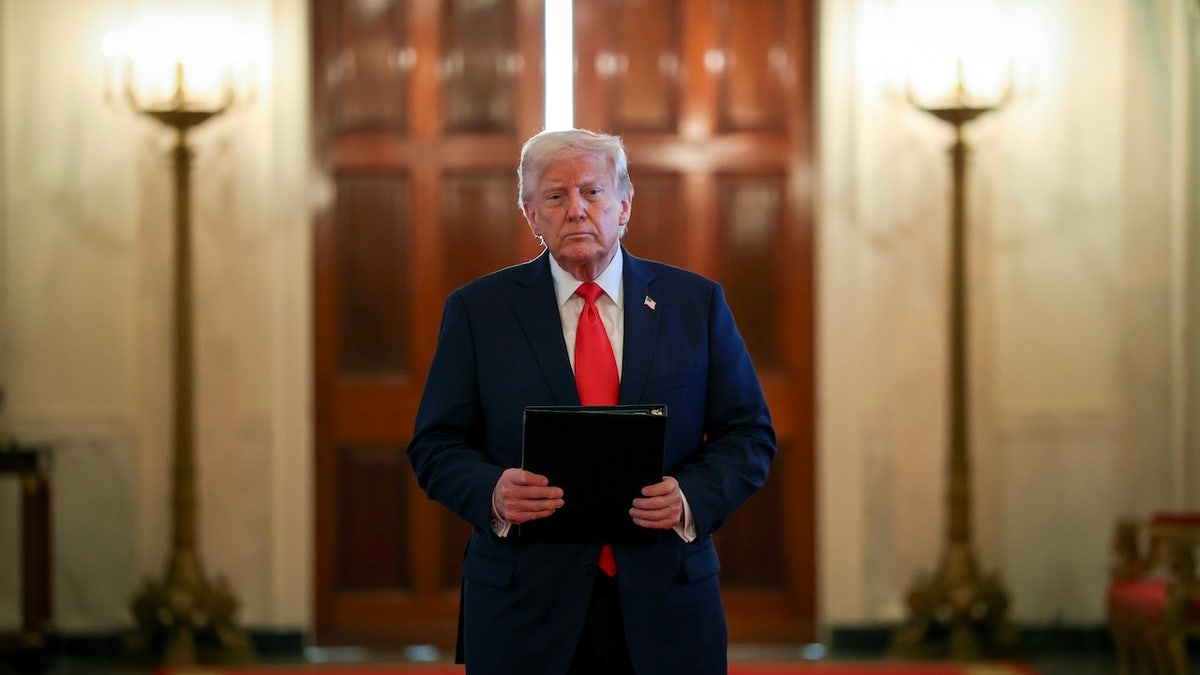
President Donald Trump arrives for a presentation ceremony in the East Room of the White House on April 15, 2025 in Washington, D.C. (Win McNamee/Getty Images)
While Trump says tariffs will target foreign competitors and reduce the trade deficit, the costs will fall mostly on working- and middle-class Americans who buy the bulk of imported goods.
Wolfers said Trump’s focus on the trade «deficit» is based on a common misconception.
«What that means is we sell China a small amount of stuff, and they sell us a large amount of stuff,» he explained. However, for every dollar bill that goes to China, the U.S. gets something for it that Americans want to buy, like T-shirts.
«We have a dollar deficit – but we have a stuff surplus.»
Potential for deescalation
There are few signs that Trump’s tariffs will deliver the gains he sought, such as onshoring U.S. production or securing better trade deals, particularly with Asian countries.
Instead, experts warn these countries are likely to circumvent U.S. markets and supply chains over time.
«If these tariffs stay in place, there will be hardly any trade between the U.S. and China,» by the second half of the year, Gary Clyde Hufbauer, a senior non-resident fellow at the Peterson Institute for International Economics, said in an interview.
Roughly $650 billion in annual trade between the two countries is at risk, along with knock-down effects on global commerce in the long term.
WORLD LEADERS REACT AS TRUMP RE-ENTERS THE WHITE HOUSE
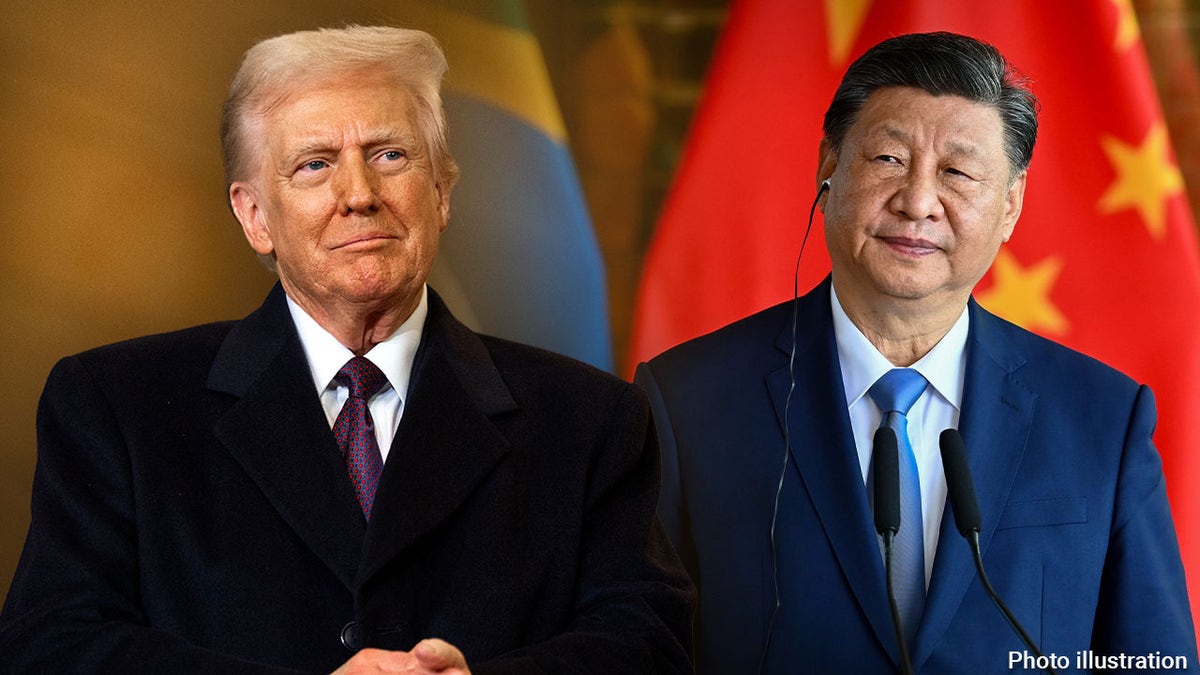
President Donald Trump, left, and Chinese leader Xi Jinping.
Trump’s tariffs also discard decades of international understanding that has depoliticized trade disputes, Feldman said.
The U.S. is «moving from a system that at least was based on mutually acceptable rules of behavior to a system that does not have that as its anchor,» Feldman, whose research focuses on global trade policy, told Fox News Digital. That shift allows the government to target foreign nations individually and offer selective tariff relief to firms and industries «if they do ‘our’ bidding,» he argued.
«America is now master of the shakedown.»
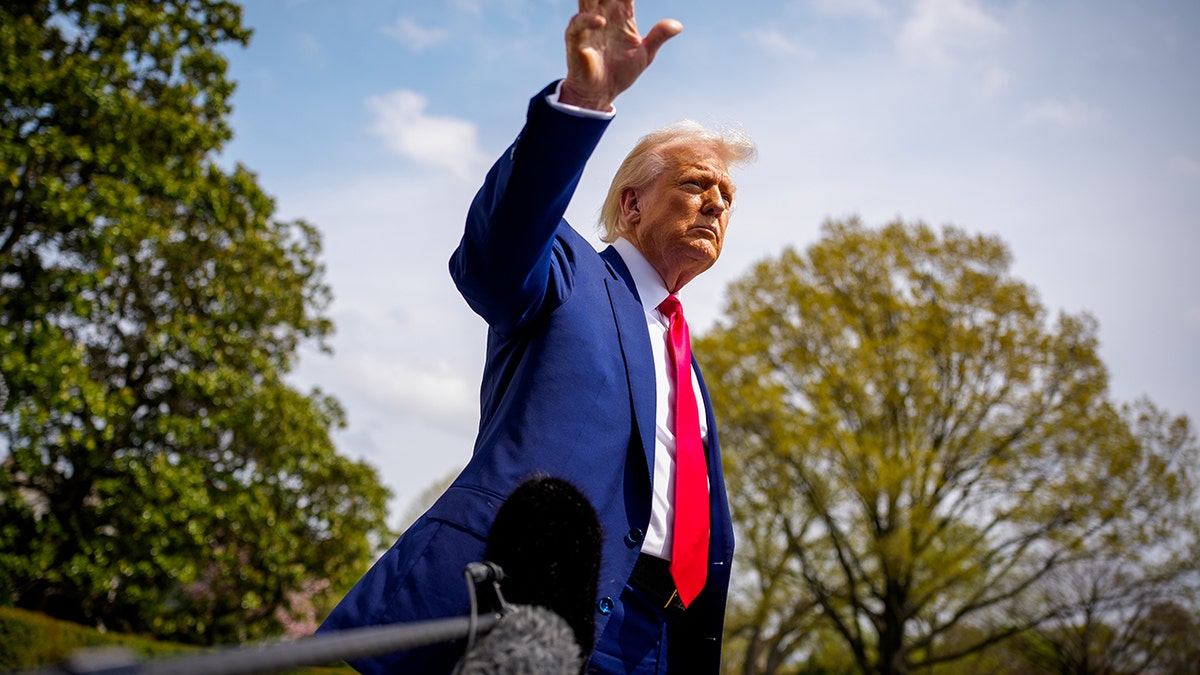
President Donald Trump gestures to members of the media before boarding Marine One on the South Lawn of the White House on April 3, 2025 in Washington, D.C. Trump spoke a day after announcing sweeping new tariffs targeting goods imported into the U.S. on countries including China, Japan and India. (Andrew Harnik/Getty Images)
Next steps
After market backlash, Trump appears to be warming to the idea of easing his proposed 145% reciprocal tariffs on China, which has vowed to impose its own retaliatory measures on U.S. goods.
Economists say he is more likely to do so if the economy sours, or he sees a major drop in poll numbers, if the past is precedent.
Still, any path to deescalation remains uncertain. Just last week, China denied Trump’s claim that the two countries were negotiating a tariff deal, after he asserted in an interview that he had reached «200 deals» on trade.
Economists believe Trump will at least partially scale back the tariffs before July but warn he is playing a high-stakes game of brinkmanship that could hit U.S. consumers and businesses hardest.
«What I worry about is that the immediate impact of uncertainty is on business investment in trade-exposed industries, leading to a recession,» Feldman said. «But it could get worse, if it transmits into a financial panic. And if everyone starts to say, ‘geez, I got to get into gold and cash, I can’t be in Treasury bills.’ If we move into a flight to cash, all bets are off.»
Should that happen, he said, «We could slide into 2008 all over again.»

A television broadcasts market news on the floor of the New York Stock Exchange in New York on Friday, April 4, 2025. (Michael Nagle/Bloomberg via Getty Images)
Trump has refused to concede that his early days have been anything but a major success.
In a recent interview with Time magazine, he touted his first 100 days as «very successful,» saying «people [are] writing that it was the best first month, and best second month, and really the best third month» for a U.S. president.
He dismissed stock market volatility and rising inflation as temporary «market fluctuation,» calling it a «transition period» that would level out.
When asked if he would consider it a win if tariffs remained as high as 50% on imports a year from now, Trump said he would.
CLICK HERE TO GET THE FOX NEWS APP
«Total victory,» he said.
«Everybody is going to benefit.»
Trump’s First 100 Days,Donald Trump,Politics,Trade,Taxes
INTERNACIONAL
Israeli foreign minister slams UN, calls it ‘rotten, anti-Israel, and antisemitic body’

Israel’s foreign minister slammed the United Nations on Monday as the organization’s court opened a hearing on Israel’s legal responsibilities in Gaza.
Gidon Sa’ar said that the U.N. is a «rotten, anti-Israel, and antisemitic body,» which ought to be on trial for covering up terror affiliates within the United Nations Relief and Works Agency for Palestinian Refugees in the Near East (UNRWA), who he said participated in the attacks of Oct. 7 2023. «The U.N. must answer for these crimes,» Sa’ar said.
He told reporters that Israel had decided «not to take part in this circus,» which is intended to deprive Israel of its «most basic right to defend itself.»
OFFICIALS IN BIDEN ADMIN WORKED TO UNDERMINE NETANYAHU AFTER CEASEFIRE TALKS COLLAPSED, FORMER AIDE SAYS
The IDF and ISA eliminated Hamas terrorist, Nukhba commander, Mohammad Abu Itiwi. He was involved in the murder and abduction of Israeli civilians on October 7th. Itiwi worked for UNRWA according to the Israelis. (IDF Spokesman’s Unit)
«Secretary-General [Antonio] Guterres is personally accountable. He knew what was going on in UNRWA. He knew very well and he knows very well. Israel repeatedly warned him. He did nothing. He went out of his way to whitewash UNRWA. He continues to cover up the crimes of UNRWA and its terrorist employees.»
Jewish News Syndicate reported that Sa’ar later presented evidence that 25% of UNRWA staff «were implicated in terrorist activity» prior to Oct. 7, 2023. Sa’ar said that UNRWA is a proxy of the terror group Hamas.
Fox News Digital reached out to Guterres’ spokesperson seeking comment on Sa’ar’s accusations, but did not get a response.
In a statement to the press on Monday, Guterres’ spokesman, Stéphane Dujarric, told a reporter that he didn’t «think the Secretary General is a big fan of a circus.» Calling the presentation to the ICJ «extremely detailed and very clear and very legal,» he also said that Guterres was «very clear [and] straightforward» when the U.N. «first revealed the Israeli allegations against UNRWA.» Dujarric said that UNRWA Commissioner-General Phillipe Lazzarini «took extremely quick action» responding to the complaints.
HEAD OF UN WATCHDOG SAYS UNRWA HIRED PEOPLE ‘WHO WERE SUPPORTING TERRORISM’
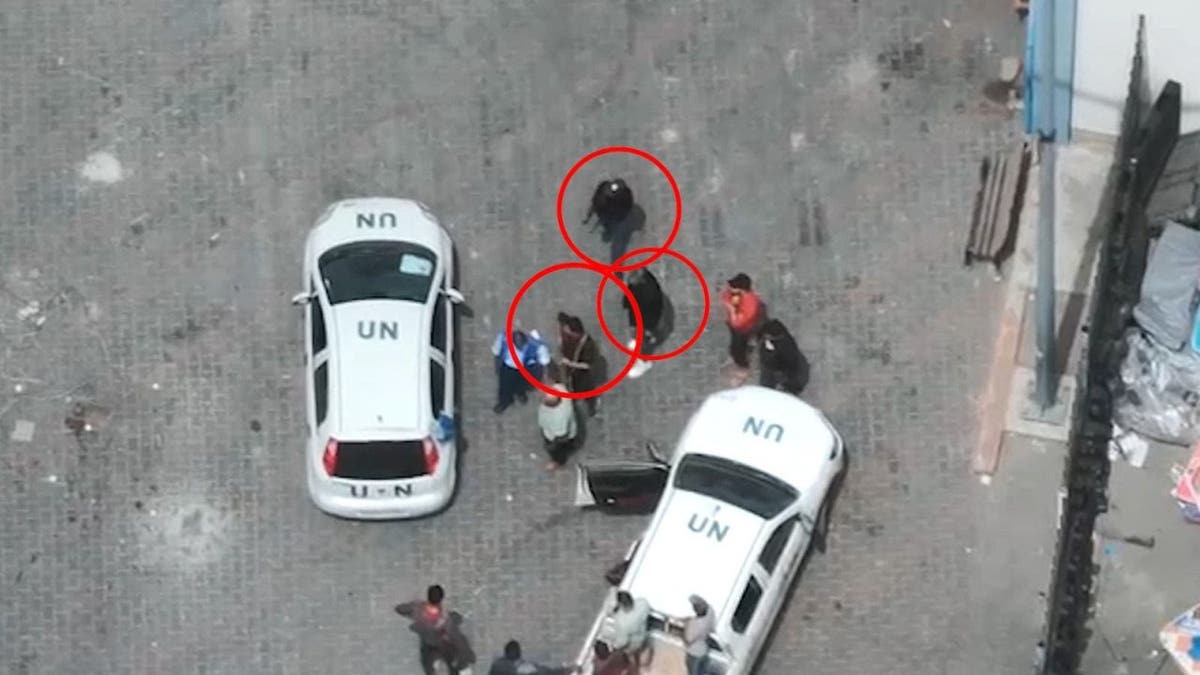
Photos released by the Israeli Defense Force show three individuals that the Israeli military claims are Hamas terrorists inside an UNRWA compound in Rafah. (IDF)
Lazzarini terminated the appointments of some of the UNRWA staffers who participated in the Oct. 7 attacks.
Dujarric also noted the «depletion of critical stocks» in Gaza since Israel blocked all aid to Gaza in March in an attempt to force a ceasefire with Hamas. Not only is food running out, but Dujarric said that trauma-related medical supplies, surgical supplies, therapeutic milk, medicines, and other important items are in short supply.
In a statement regarding the ICJ hearings on April 28, U.N. Legal Counsel Elinor Hammarskjöld outlined the U.N.’s concerns about Israel’s occupation of the Palestinian territories. Referencing the Israeli Knesset’s law banning UNRWA’s operation, passed in October 2024, she stated that Israel cannot deny impartial humanitarian organizations from providing relief, and that concerns about the impartiality of such organizations may not be made unilaterally by an occupying power.
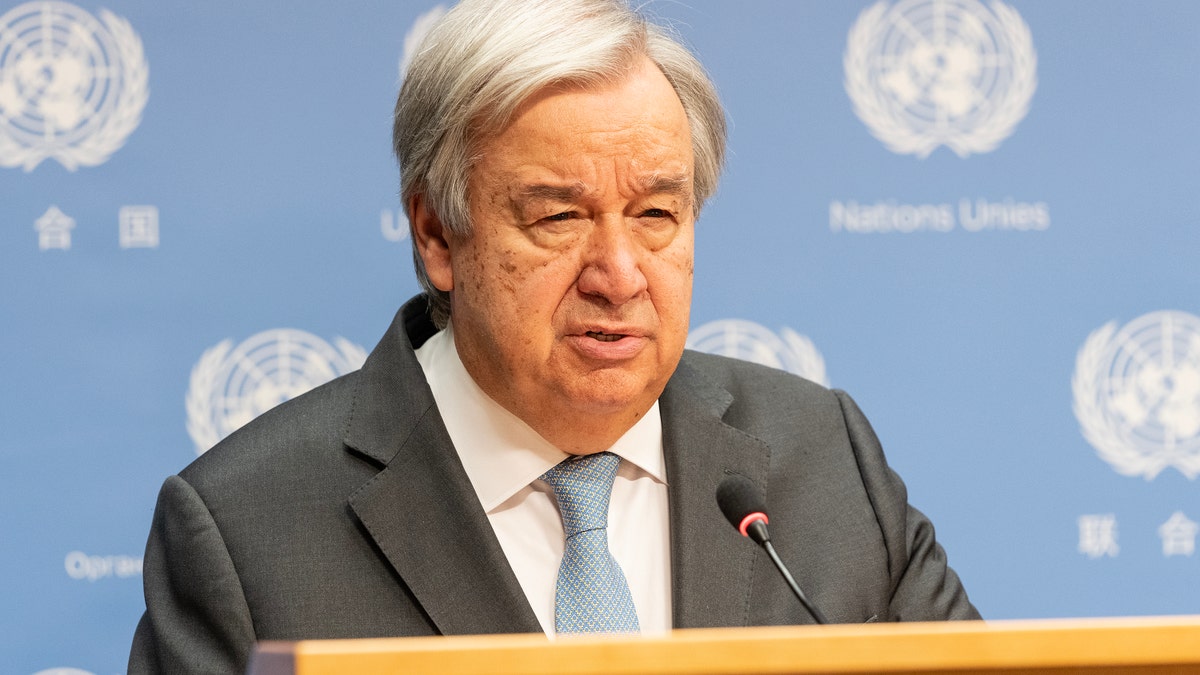
Secretary-General Antonio Guterres delivers a statement at UN Headquarters on the situation in the Middle East following the terrorist attack by Hamas on Israel. He reiterated his concern for civilian lives to be protected, he thanked Egypt for its help via Rafah crossing into Gaza and stated that humanitarian aid should be delivered to people of Gaza. (Lev Radin/Pacific Press/LightRocket via Getty Images)
Hammarskjöld also said that U.N. premises are «inviolable,» per the Geneva Convention, and «immune from search, requisition, confiscation, expropriation, or any other form of interference.»
In February, however, the State of Israel’s statement on the ICJ’s proceedings noted various incidents that demonstrate how UNRWA has violated the guiding principles of «neutrality, impartiality, and independence» mandated by the U.N.
CLICK HERE TO GET THE FOX NEWS APP

A military parade of the Hamas terrorist organization before the transfer of four Israeli female hostages to the Red Cross on January 25th, 2025. (TPS-IL)
Israel’s statement also lays out a variety of times when terrorist organizations «use and exploit UNRWA installations as hideouts and places of refuge» and claims agency staff «have assisted or closed their eyes to terrorists seeking refuge at those sites.» The U.S. suspended aid to UNRWA after learning that some of its members participated in the Oct. 7 attack.
On April 24, the U.S. Justice Department determined that UNRWA, as a specialized agency of the U.N., is not entitled to diplomatic immunity in the U.S. In a lawsuit filed in June 2024 in the Southern District of New York, 100 victims of the Oct. 7 attack are seeking $1 billion in damages from UNRWA. Lazzarini is a named defendant in the suit.
-

 POLITICA15 horas ago
POLITICA15 horas agoEl PRO confía en alcanzar un acuerdo con LLA en la Provincia: “Parece que hubo un aprendizaje de Karina Milei”
-
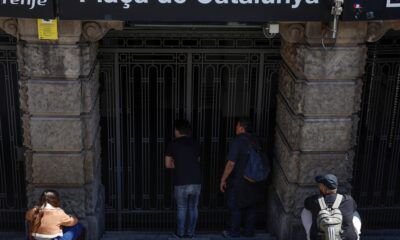
 INTERNACIONAL1 día ago
INTERNACIONAL1 día agoEl apagón en España dejó varadas a 30 mil personas que viajaban en tren
-
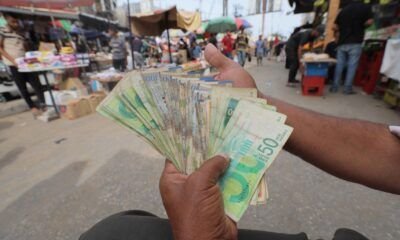
 INTERNACIONAL3 días ago
INTERNACIONAL3 días agoUN cash app for Gazans exploited by Hamas as terror group steals aid money meant for civilians




